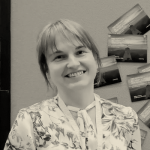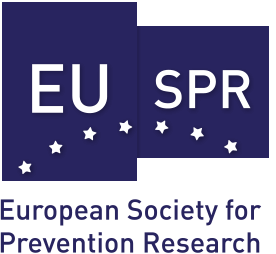What is EUSPR
The European Society for Prevention Research (EUSPR) is a scientific society which was established in order to promote evidence-based prevention to tackle determinants of non-communicable disease and ill-health, which is not paralleled by investment in human resources and education.
Mission
To promote the inclusion of science-based principles of prevention in policies addressing non-communicable health issues, such as obesity, psychoactive substance use, violence, crime, mental and sexual health.
Why the EUSPR was established
In the European countries there is a growing interest for evidence-based prevention to tackle determinants of non-communicable disease and ill-health, which is not paralleled by investment in human resources, interventions and policies, training and education.
Consequently, this sector of research is not on the top agenda of most universities and institutions. Prevention scientists work in a rather isolated and mono-disciplinary world, while good quality research in this field requires cooperation and methodological development beyond the borders of traditional academic disciplines such as medicine, psychology, epidemiology, biostatistics, social scientists, anthropology.
There are no scientific societies in Europe that include these very specific themes. The EUSPR was born to fill this gap, and has since grown into an advisory body for national and European institutions such as the EMCDDA and EUCPN to safeguard scientific caution, independence and prudence in the assessment of interventions, training contents and innovations.
Cornerstones of this advancement are:
- Cross-disciplinary networks of scientists;
- decision-, opinion- and policy makers and practitioners;
- methodology development;
- promotion of higher education and career development in prevention;
- implementation research;
- advocacy for evidence-based prevention
Events
Annual EUSPR conferences with specific topics and meeting with EUSPR members.
Membership of the Society
Membership in EUSPR is open to qualified professionals who work in the field of prevention: all European and international researchers, professionals, practitioners, policy makers and students who share the Society’s aims. We also encourage membership from all countries, particularly those professionals who wish to develop collaborative links with European researchers and decision-makers involved in prevention.
Current EUSPR membership benefits include:
- Inclusion in the only European-wide network of prevention researchers, practitioners, and stakeholders
- Reduced EUSPR conference fees
- Participation in Technical Committees
- Participation in EUSPR activities (training, research projects, etc.)
- Eligibility for election to the EUSPR Board
- EUSPR newsletters
- Networking
- Alerts about job opportunities
EUSPR Board of Directors
The Board of Directors is the governing body of the Society. The Board are all volunteers and comprise:
President

Dr Gregor Burkhart, MD, MPH
Principal Scientific Analyst, European Monitoring Centre for Drugs and Drug Addiction (EMCDDA), Portugal
Gregor Burkhart is since 1996 responsible for prevention responses at the EMCDDA in Lisbon. He developed databases of evidence-based programmes (Xchange), evaluation and prevention mapping tools and is currently implementing the European Prevention Curriculum (EUPC) in Europe and beyond. His main activities are to develop common European indicators on the implementation of prevention strategies and programmes in member states, to promote across European countries a better understanding of universal, selective, indicated as well as of environmental prevention and to support the implementation of evidence-based prevention approaches.
President Elect

Prof Elena Gervilla
Associate Professor, Faculty of Psychology, University of the Balearic Islands, Spain
Elena Gervilla is an Associate Professor and works at the Faculty of Psychology (Area of Methodology of Behavioural Sciences) at the University of the Balearic Islands (UIB, Spain). She is part of the Research Group in Data Analysis (UIB) and the group ‘Statistical and psychometric procedures applied in Health Sciences’ affiliated to the Institute for Health Research of the Balearic Islands (Idisba). Her research has been dedicated to projects centered on health promotion, prevention, and fostering healthy behaviors. Elena has actively collaborated in conducting thorough evaluations of interventions designed to enhance mental health outcomes, employing a combination of qualitative and quantitative methodologies for a comprehensive assessment.
Secretary

Mariàngels Duch
Project management, European Institute of Studies on Prevention (IREFREA), Spain
Mariàngels is the European Project Manager at the European Institute of Studies on Prevention network. She has been actively involved in research in risk behaviours and implementation of prevention programmes coordinating several EU funded projects (see http://www.irefrea.eu for projects and publications). She is actively involved in networks like the Club Health initiative and the Civil Society Forum on Drugs, and actively collaborates in the launching of the Platform on Best Practice promoted by the Spanish National Plan on Drugs.
Treasurer

Marina Alves de Souza
Global Head of Legal
Marina has been involved in and supporting EUSPR with legal assistance since 2010. She provided ad hoc legal counselling, wrote the EUSPR bylaws and, more recently, she drafted its its code of ethics and grievance procedures. She has been volunteering for two years as treasurer of WISTA – Women in Shipping and Trading Association (Switzerland unit), a global organisation formed in 1974 connecting female executives and decision-makers around the world, and she is also Global Head of Legal of an international enterprise.
Lead of the EUSPR Early Careers Forum

Boris Chapoton
Project Manager, Université de Lyon, Université Jean Monnet, Saint-Etienne, France
Boris is currently working as a project manager at Lyon University, Jean Monnet University, Saint-Etienne, France. Boris has been a member of EUSPR since 2015 and has been particularly active within the Early Careers Forum. Coming from a training background integrating Psychology and Public Health, he applies Marketing approaches to his main research interests that lie in the media’s influence on health-related behaviour.
Board members at large

Prof Zila Sanchez
Professor at the Universidade Federal de Sao Paulo
Zila has been a professor in Brazil, since 2013, and she has been working on evaluating and disseminating European programs in her country. In that year, she started her participation in EUSPR activities. She is now the Editor-in-Chief of the Journal of Prevention, the Oficial Journal of the European Society for Prevention Research, for the quinquennium 2022-2026.
Board members at large

Angelina Brotherhood
Health Expert in the Austrian National Public Health Institute
Angelina is a Sociologist and a Health Expert at the Addiction Competence Centre of the Austrian National Public Health Institute in Vienna; as well as the prevention expert within Austria’s REITOX National Focal Point to the EMCDDA. She has been working in the development and promotion of the European Drug Prevention Quality Standards (EDPQS), as published by the EMCDDA, and she has also contributed to the UNODC/WHO International Standards on Drug Use Prevention.
Board members at large

Dr Nick Axford
Associate Professor, University of Plymouth, UK
Nick is an Associate Professor of Health Services Research at the University of Plymouth, UK, and a Senior Associate of the Dartington Service Design Lab. He has worked in prevention and early intervention research for over 20 years, focusing on how to improve psychosocial outcomes for children and families in a range of subject areas (e.g. bullying, behaviour, social-emotional learning, maltreatment).
Board members at large

Dr Ina Koning
Associate Professor, Vrije Universiteit, Amsterdam, Netherlands
Ina is an Associate Professor at Clinical Child and Family studies at Vrije Universiteit Amsterdam. She has made a significant contribution to research on youth risk behavior in interaction with the social context, applied to both substance addiction as well as behavioral addictions (social media use). She has made a significant contribution to research on parenting and the prevention of adolescent substance use and problematic online behaviour; including intervention development and translation, implementation, and evaluation. Currently she is PI of the evaluation of a community-based intervention targeting substance use and mental health in the Netherlands. She highly values the translation of her work to practice, and has a history of disseminating her work to utilize the knowledge gained in the most comprehensive way possible.
Board members at large

Dr Rachele Donini
Head of the Prevention and Health Promotion, ASL2 Savonese, Italy
Since 2007, Rachele has been at the Head of the Prevention and Health Promotion Unit in the mental health and addiction Department of ASL 2 in Savona (Italy). She collaborates with the manager to run the addiction Department and her specific mission is planning and implementing drug prevention interventions with the main local, regional and national stakeholders. Part of her work is addressed to train teachers and students and to offer knowledge and expertise to public and private institutions about prevention planning and interventions. At the moment, Rachele is the Scientific Coordinator of the European project “ASAP-Training” aiming to disseminate and train European Master Trainers on the most updated and effective prevention science interventions.
Board members at large

Dr Samuel Tomczyk
Postdoctoral researcher, University of Greifswald, Germany
Samuel has been a member of the EUSPR since 2017. He completed his doctorate in Psychology at the University of Kiel, focusing on multiple substance use in adolescents, and started his postdoctoral research on prevention in civil protection at the University of Greifswald. In addition to his research, he has worked on the development, implementation, and evaluation of school-based prevention projects. His main interests include health across the life span, substance use, and methodology in prevention research.
Board of advisors

Prof Federico Leguizamo
Professor at the University of the Balearic Islands
Human performance psychologist and professor at the University of the Balearic Islands. Federico actively participates as a researcher at the Behavior and Technology Laboratory (BATLAB), the Data Analysis Research Group (GRAD) of the Universitat de les Illes Balears, and the Statistical and Psychometric Procedures Applied in Health Sciences (PSICOMEST) of the Health Research Institute (IdISBa).
Board of advisors

Dr Karin Streinmann
Researcher in the Children and Youth Unit, National Institute for Health Development, Estonia
Karin Streimann is a researcher in Estonian National Institute for Health Development and a guest lecturer in Tallinn and Tartu University. She has educational background in social work. Her work and research are interdisciplinary, involving the educational, social and health sector in the prevention of behavioural health problems such as externalizing and internalizing problems as well as substance use.
Board of advisors

Dr Giovanni Aresi
Researcher at Università Cattolica del Sacro Cuore, Italy
Giovanni is a researcher and professor of Community Health Psychology at Università Cattolica del Sacro Cuore, Italy. His research focuses on young people’s healthy behaviours (from substance use to dietary patterns), with a primary emphasis on the adoption of a participatory approach in conducting research and intervention evaluation.
Administrative support to the Board of Directors

Yasmina Castaño
Predoctoral researcher, European Institute of Studies on Prevention (IREFREA), Spain
Yasmina is currently developing her PhD in Psychology at the University of the Balearic Islands (UIB, Spain). Since 2018, she has been working in the development and implementation of research projects at the European Institute of Studies on Prevention (IREFREA).
Conference support

Joella Anupol
Predoctoral researcher, University of the Balearic Islands (UIB), Spain
Joella is currently developing her PhD in Psychology at the University of the Balearic Islands (UIB, Spain). Since 2017, she has been working in project and team management. She is currently working as an addiction prevention psychologist at UIB.
